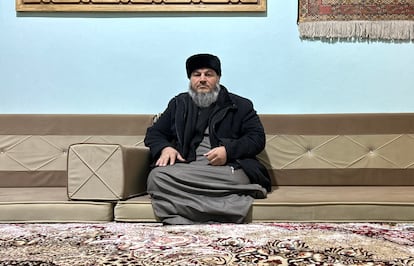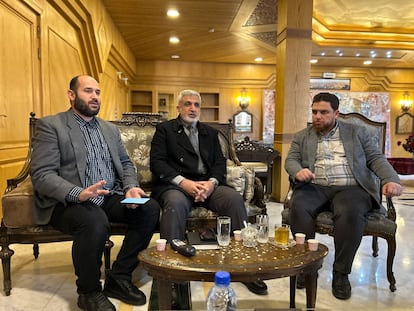Islamist technocracy: How HTS, the group leading change in Syria, became a force capable of defeating Assad
After distancing itself from Al Qaeda, the militia spent years trying out an administration in Idlib province that set it apart from other rebel factions and which it is now partially transferring to the rest of the country


Young Rami returned to his home province of Idlib (north-west Syria) a few days ago after years as a refugee in Lebanon. On Sunday — a working day — he went to renew his identity card and the process was so quick and the staff so friendly that he asked to see the director to congratulate him. “When I entered his office he got up from his chair to greet me,” he says with surprise: “I swear I told him: ‘If you keep treating us this well, we’ll end up getting used to it.’”
For decades, Syrians have expected nothing from the authorities except humiliation and abuse. The state has meant corruption and endless bureaucratic procedures; the fear of being spied on, arrested, and tortured. Many Syrians EL PAÍS has spoken to in recent days speak of the anxiety they felt at having to pass a checkpoint every time they moved from one place to another: they knew that to get through they would have to pay a bribe, although they didn’t know how much, and that, depending on the mood of the official on duty, they could end up in the barracks or forcibly recruited into the army. So now that the checkpoints are manned by militants from the fundamentalist militia Hay’at Tahrir al-Sham (HTS) who behave politely and even smile, this alone is an impressive step forward for many citizens.
Institutions, institutions, institutions. This is the message that Abu Mohammad al-Julani, leader of HTS, the armed group that has seized power in Syria after leading the offensive to overthrow Bashar al-Assad, has been insisting on for days. “The Syrian revolution has won, but Syria cannot be led with a revolutionary mentality. Laws and institutions are needed,” stressed Al-Julani on Saturday, who now prefers to leave behind his nom de guerre and use his real name, Ahmed Hussein al-Shara.
The Aleppo provincial delegation building is a tall skyscraper with some of its windows shattered; it was a snipers’ nest during the battle for the city between 2012-2016 and also suffered during the offensive that began at the end of last month. In its main office, lit by an ostentatious chandelier with crystal tears, heavy curtains cover the broken windows, through which filters the freezing December air and the cries of street market traders. It is guarded by a bearded HTS military policeman and served by a clean-shaven official from the former regime. A triumvirate from Idlib has taken over the governorate to try to get it up and running. For the moment, they are trying to assess the situation: they estimate that 95% of the officials have taken up their posts, although, they admit, they do not know for sure how many employees they have, due to the rampant “corruption” and “nepotism” during the Assad regime. “We are trying to preserve and use the previous structures. For the moment, without changing any laws, maintaining the template, and completing what is missing,” explains Fawaz al-Helal. And at the same time, “introduce the model and experience that we have followed in Idlib,” adds Abd al-Wahab Daas.

Idlib is a small, conservative province in the northwestern corner of Syria bordering Turkey, where HTS defeated the other Islamist and rebel factions by force of arms in 2019. The group established the so-called Salvation Government to govern the territories under its control. In 2020, when this newspaper visited Idlib, it was a place with barely any running water or electricity, no cell phone coverage, and hardly any employment opportunities. Its 3.5 million inhabitants (two-thirds of whom were displaced) were struggling to survive. “We have faced numerous crises. Covid-19, continuous bombings, the earthquake in 2023, and we have proven ourselves capable. Even in a state of war, we developed the province and people saw that they could trust us. We have instructed our staff not to accept bribes and to cultivate the trust of the population,” says Mohamed al-Asmar, head of communications at the Salvation Government’s Media Ministry. And it is true that services have improved; there are fewer people living in tents, new homes have been built, supermarkets are much better stocked than in the rest of Syria (you can even buy new iPhone 16s), there are workshops, some factories, and two local cell phone companies.
“I see everything very differently. It’s more civilized and safer. I’m proud of the guys in charge,” says Rahiha, a woman in her 50s who recently returned to Idlib. Another change compared to 2020 is that there are no longer so many militiamen on the streets — then they were from different groups, some of them foreign jihadists — and the police of the Ministry of the Interior of the Salvation Government patrol in their brand new vehicles.
Four years ago, a local source described the Salvation Government as “HTS in civilian clothes,” but since then its representatives have acquired a personality of their own. Its members, explains Al-Asmar, are chosen for “their revolutionary commitment” and for “effectiveness and capacity,” through the so-called Shura Council, which acts as a parliament and is chosen from among local notables and representatives of professions (all men). However, he assures that this is not the model that HTS seeks for all of Syria. “There will be elections; we could not hold them because we were in a context of war, but that has changed,” he promises.
“What makes me optimistic is that they are well-trained people. Although from outside they say they are a terrorist group, we have not seen anything like that so far, but we have spoken with dignified and educated people,” says Syriac Catholic Archbishop Denys Antoine Shahda.
Islamist gradualism
Behind this shift is, of course, the “pragmatism” of its leader, Ahmed Hussein al-Shara, writes Syrian analyst Haid Haid on the social network X: “Using a gradual strategy that mixes patience, coercion and persuasion [...] has allowed him to implement his objectives little by little, adapting to the reactions of the population in order to minimize negative reactions.” One example of this has been his change of tack regarding minorities, which he began to implement in Idlib, returning land and restoring Druze and Christian sanctuaries that had previously been captured by Islamist militants.
An HTS commander who calls himself Abu Muhamad al-Halabi and who has fought with the group since it was known as the Al-Nusra Front and had not yet distanced itself from Al Qaeda, says Al-Shara is a “charismatic and intelligent” man, capable of accepting criticism. “He is a leader, not a dictator.” He cites as an example that when his leadership has been questioned within the group, he has offered to be replaced by another, although his commanders have always ended up supporting him.
There are still some very radical Islamists within HTS, but Al-Shara has been putting things in place for years to prevent its base of operations from becoming a center for exporting jihadism and to differentiate itself from more extremist groups such as Islamic State (ISIS). Al-Halabi explains it this way: “There are two types of jihad: the expansive and the defensive. The expansive, to spread Islam to other countries, is no longer necessary because everyone has access to the internet and can learn about God’s message. The defensive was necessary to defend ourselves from the Assad regime.”
How HTS has become a monumental shock force, capable of defeating an army that far outnumbered and outgunned them, is justified by years of work, the imposed hierarchy, and the military academy established in Idlib. And a rigid moral code to prevent corruption, which has set them apart from other rebel groups that, when they were not on the front, were engaged in fighting each other and extorting the population in a way not very different from the Assad regime’s soldiers. “Turkey has seen the difference between our model and the territories it supports, governed by other groups. They have seen the difference in management, economy... so relations with Turkey have improved,” says Al-Halabi, although he denies having received funding from Ankara. The funds to run HTS and the Salvation Government come mostly from taxes and fees on imports through Turkey, and on trade, as well as from the smuggling of products sent to areas under regime control. “And our weapons are Russian, those we captured from the army,” he says.
Sign up for our weekly newsletter to get more English-language news coverage from EL PAÍS USA Edition
Tu suscripción se está usando en otro dispositivo
¿Quieres añadir otro usuario a tu suscripción?
Si continúas leyendo en este dispositivo, no se podrá leer en el otro.
FlechaTu suscripción se está usando en otro dispositivo y solo puedes acceder a EL PAÍS desde un dispositivo a la vez.
Si quieres compartir tu cuenta, cambia tu suscripción a la modalidad Premium, así podrás añadir otro usuario. Cada uno accederá con su propia cuenta de email, lo que os permitirá personalizar vuestra experiencia en EL PAÍS.
¿Tienes una suscripción de empresa? Accede aquí para contratar más cuentas.
En el caso de no saber quién está usando tu cuenta, te recomendamos cambiar tu contraseña aquí.
Si decides continuar compartiendo tu cuenta, este mensaje se mostrará en tu dispositivo y en el de la otra persona que está usando tu cuenta de forma indefinida, afectando a tu experiencia de lectura. Puedes consultar aquí los términos y condiciones de la suscripción digital.








































